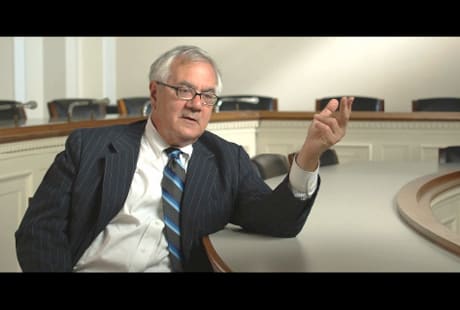In 2001, the deregulation of banks in Iceland allowed investors and the like to accrue excess foreign debt, raising household disposable income and investment scope beyond their small domestic market. This effectively inflated their economy and made the krona the most overvalued currency in the world. Offering liquidity loans and suffering the resultant effects of carry trading, their economy imploded when they were unable to repay their debts, causing the inevitable unemployment and deterioration of quality of life and pension funds.
This microcosm is used in the opening moments of Inside Job to describe just what brought on the recent global financial crisis, citing deregulation, the Gramm-Leech-Bliley Act (which allowed commercial banks, investment banks, securities companies and insurance companies to consolidate) and an incestuous relationship between academics, Wall Street authorizes and politicians as the main reasons.
Using a variety of interviews with various specialists, lobbyists and professors, along with the occasional economics animation to make clear some of the more convoluted principles, this documentary boils everything down to male greed and need for power. It even tosses in some nastiness about cocaine and hookers to vilify finance types, as if the embarrassing interview clips and constant title cards pointing out who refused to be interviewed weren't enough.
While it makes a valid point about the importance of regulation, noting the incomes of people that really don't deserve so much money, it's also exceedingly myopic, much like Michael Moore's similarly themed doc, Capitalism: A Love Story. Director Charles Ferguson shows the economic crisis negatively affecting Chinese workers that labour for U.S. companies, ignoring their standing in the global economy, also noting that high-tech companies like Google and Intel don't have the same conspiracies and controversies as financial companies like Enron and AIG. This may be an interesting observation, but given how new these high-tech industries are and their limited competition, it's not a valid point to make.
What Inside Job does do well is explain finance and currency exchange in a way that neither patronizes nor complicates, making accessible a facet of knowledge typically limited to desiccated suits. It does highlight some important factors, such as the tendency for consumer protection boards to hire the very people that benefit from deregulation, but mostly it's single-minded soapbox preaching from someone uninterested in understanding the other side of the issue.
(Mongrel Media)This microcosm is used in the opening moments of Inside Job to describe just what brought on the recent global financial crisis, citing deregulation, the Gramm-Leech-Bliley Act (which allowed commercial banks, investment banks, securities companies and insurance companies to consolidate) and an incestuous relationship between academics, Wall Street authorizes and politicians as the main reasons.
Using a variety of interviews with various specialists, lobbyists and professors, along with the occasional economics animation to make clear some of the more convoluted principles, this documentary boils everything down to male greed and need for power. It even tosses in some nastiness about cocaine and hookers to vilify finance types, as if the embarrassing interview clips and constant title cards pointing out who refused to be interviewed weren't enough.
While it makes a valid point about the importance of regulation, noting the incomes of people that really don't deserve so much money, it's also exceedingly myopic, much like Michael Moore's similarly themed doc, Capitalism: A Love Story. Director Charles Ferguson shows the economic crisis negatively affecting Chinese workers that labour for U.S. companies, ignoring their standing in the global economy, also noting that high-tech companies like Google and Intel don't have the same conspiracies and controversies as financial companies like Enron and AIG. This may be an interesting observation, but given how new these high-tech industries are and their limited competition, it's not a valid point to make.
What Inside Job does do well is explain finance and currency exchange in a way that neither patronizes nor complicates, making accessible a facet of knowledge typically limited to desiccated suits. It does highlight some important factors, such as the tendency for consumer protection boards to hire the very people that benefit from deregulation, but mostly it's single-minded soapbox preaching from someone uninterested in understanding the other side of the issue.
